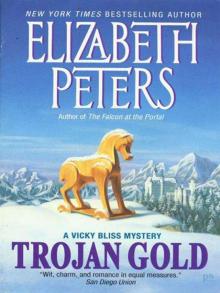- Home
- Elizabeth Peters
He Shall Thunder in the Sky taps-12 Page 19
He Shall Thunder in the Sky taps-12 Read online
Page 19
“We must assume there are several agents of the Central Powers still at large,” Ramses said. “One at least has had access to information that was known only to a few. There have been a number of leaks, some of them involving the Canal defenses.”
“You’ve no idea who it might be?” Emerson asked.
“Russell suspects Philippides. He knows everything that is known to Harvey Pasha, which is why I won’t… Mother, what do you think you are doing?”
“Pay no attention to me,” I said, removing his shoe and starting to unlace the other one.
“How would the head of the local CID know about the Canal defenses?” Emerson inquired.
Ramses sighed. “The devil of it is that all these departments are interconnected in one way or another. They have to be, since their functions overlap, but that makes it damned difficult to trace the source. Philippides is in a particularly useful position; it is his responsibility to identify and remove enemy aliens. If he is as venal as rumor makes him out to be, the individual in question could be paying him to ensure his silence.”
“You think there is a single individual in charge of operations here?” Emerson asked, his keen eyes fixed on Ramses’s face.
“If it were our lot, I’d say no. We take a perverse pride in our famed British muddle. However, I give the Germans credit for better organization. They’ve been planning this for years, while we scampered around arresting harmless radicals and arguing about whether or not to formalize our bizarre position with regard to Egypt . Their man has probably been here for years, leading a normal life and ready to act when he was needed. Wardani’s little revolution is a side-show—not a negligible part of the whole, but only one of several operations, including information gathering and subversion.”
“Hmm,” said Emerson. “If we could identify this fellow—”
“Yes, sir, that would be useful.” Amusement warmed Ramses’s black eyes for a moment, to be replaced by a look of consternation. “No, Father! Don’t even think of it. We may get a lead to the man through our show, but tracking him down isn’t my job or yours. Leave him to Maxwell and Clayton.”
“Certainly, my boy, certainly. You had better get some rest now. Come along, Peabody .”
“Can I get you anything more, Ramses?” I asked. “Whiskey and soda? A few drops of laudanum to help you sleep? A nice wet cloth to—”
“No, thank you, Mother. I don’t need anything to help me sleep, and I don’t want any whiskey, and I am quite capable of washing my own face and taking off my own clothes.”
“Then I will leave you to it, on one condition.”
“What’s that?” Ramses asked warily.
“Promise me you will not go out tonight. I want your solemn word.”
Ramses considered this. “Would you believe my solemn word? All right, Mother, don’t scold; I was joking. I won’t leave the house tonight. It’s taking a chance, but I think I can safely wait another day or two.”
“A chance of what?” I asked, looking down at him.
“Of my enthusiastic young friend Farouk convincing the others that Wardani is dead and that he is his logical successor. Even if it wasn’t he who tried to kill me, he would be more than happy to take advantage of my presumed demise.” His lips curved in a rather unpleasant smile. “I’m rather looking forward to seeing the lad’s face fall when I turn up, suffering but steadfast, and worst of all, alive. Perhaps I should bare my wounds for the admiration of all. It’s the sort of theatrical gesture Wardani would appreciate.”
Chapter 6
Emerson had been less than truthful when he said he did not expect us to work on Boxing Day. We did not go to Giza , but we spent most of the day catching up on paperwork. Few laymen realize how much of this is necessary, but as Emerson always says, the keeping of accurate records is as important as the excavation itself. I did not object, since it served to keep Ramses from exerting himself. I also managed to prevent him from going out that night. He put up an argument, but of course I prevailed, adding just a touch of veronal to his after-dinner coffee in order to make certain that after I had got him into bed he would stay there.
After breakfast the following morning I drew Emerson aside.
“Can’t you invent some chore for Ramses to do here at home? I don’t believe he ought to go into that dusty hot tomb today.”
Emerson studied me curiously. “What’s come over you lately, Peabody ?”
“I don’t know what you mean.”
“You’ve turned into an absolute mother hen. You never fussed over him like this before, even when he was a child and getting into one grisly scrape after another. Now don’t deny it; you keep trying to put him to bed and make him sit down and lie down and take his medicine. When he refused a second serving of oatmeal this morning I thought you were going to pick up a spoon and feed him yourself.”
“Hmmm,” I said. “Am I really doing that? How odd. I wonder why?”
“He is terrifyingly like you, you know.”
“Like me? In what way, pray tell?”
“Brave as a lion, cunning as a cat, stubborn as a camel—”
“Really, Emerson!”
“Concealing the affectionate and vulnerable side of his nature under a shell as hard as a tortoise’s,” said Emerson poetically. “As you do, my love, with everyone except me. I understand, Peabody , but for God’s sake control yourself. All he has to do today is sit quietly on a campstool and copy texts. It should be particularly restful after his other recent activities.”
There was no denying that. However, the best-laid plans of mice and men, including Emerson, often go awry (I translate from the Scottish). When we arrived at Giza , Selim was waiting for us. Our young reis has an open, candid face, and the splendid beard he had grown in order to inspire more respect from his men failed to conceal his emotions. One look at him was all Emerson needed.
“What has happened?” he demanded. “Has a wall collapsed? Anyone hurt?”
“No, Father of Curses.” Selim wrung his hands. “It is worse than that! Someone has tried to rob the tomb.”
With a vehement oath Emerson ran for the entrance. In his haste he did not duck his head far enough under the stone lintel; I heard a thud and a swear word before he vanished inside.
The rest of us followed. Selim was babbling, as he did when he was upset. “It is my fault. I ought to have posted a guard. But who would have supposed a robber would be so bold? Here, at the very foot of the Great Pyramid, with visitors and guards and…”
Such boldness was surprising, but not unheard of. The illicit diggers who infest the ancient sites are extremely skilled and sly. Tombs like these were comparatively easy to vandalize once they had been uncovered; the fine reliefs were in great demand by collectors, and the wall surface consisted of separate blocks which could be removed one by one. In the process considerable damage was done to the plaster, but the robbers cared nothing for that, and apparently neither did the collectors. Archaeological fever temporarily replaced my other concerns, and I was in a state of profound professional agitation as I entered the dimly lit chamber.
A hasty glance round the room showed first, Emerson, upright and rigid in the center of the floor; and second, the walls intact as they had been when I last saw them. The prince Sekhemankhor and his lady gazed with serene satisfaction at the offering table before them; the long ranks of servants carrying vessels and flowers, leading cattle and cutting grain were unmarred. A great gasp of relief issued from my throat. A great shout of fury issued from Emerson.
“What the devil do you mean by this, Selim? Nothing has been disturbed. Are you afflicted by dreams and visions, or…” His eyes narrowed. Seizing the young fellow by the collar, he pulled him close. “You haven’t taken to hashish, have you?”
“No, Father of Curses.” Selim looked hurt, but not especially worried. The men were all accustomed to Emerson’s explosive temper. It was his low, measured tones they feared.
“You were too quick,” Selim went on in
an injured voice. “You did not let me explain. It is not this part of the tomb that has been entered. It is the burial shaft.”
“Oh.” Emerson released his grip. “Sorry. Show me.”
As I have explained, the tombs of this period consist of one or more rooms aboveground that served the funerary cult of the deceased. The mummy and its grave goods lay at the bottom of a deep shaft cut down through the superstructure into the underlying rock. Lacking museums and tourists desirous of purchasing works of art, the ancient thieves stole only what they could use themselves or sell to their unsophisticated contemporaries—linen, oil, jewelry, and the like. Therefore (as the Reader has no doubt deduced) they went straight for the burial chamber. Of all the tomb shafts thus far excavated, only one unplundered burial had been found.
Could this be such another? Let him who will deny it, but that hope is foremost in the minds of all archaeologists. Amelia P. Emerson is not such a hypocrite. I wanted—primarily of course for my dear Emerson—an untouched burial, with its grave goods intact—collars of gold and faience, bracelets and amulets, an inscribed coffin, vessels of copper and stone—a burial even finer than the one Mr. Reisner had discovered two years earlier. There was cause for optimism. The knowledgeable tomb robbers of Giza had considered the shaft worth investigating.
It had been completely filled with sand. Emerson had intended to leave it till the last, since, as I have explained, there is seldom anything down there. The opening had been located, however, and it was there we went.
Someone had certainly been doing something. Where there had been only a dimple in the ground now gaped a hole some three feet deep. Stone lined it on all four sides and sand was scattered around the opening, the unmistakable signs of a hasty excavation.
Hands on hips, brows lowering, Emerson stared down into the hole and remarked forcibly, “Curse it!”
“Why do you say that, Emerson?” I inquired. “Surely this is a hopeful sign. The tomb robbers of Giza —”
“May already have found what they were looking for,” Emerson said.
“So near the surface?” Ramses asked. He put out a hand to steady Nefret, who was teetering on the edge of the opening.
Emerson brightened. “Well, perhaps not. They may have been frightened away by a guard. I made it easy for the bastards, though, erecting that roof to hide them from passersby. Now I suppose we must clear the damned thing out before they have another go at it.”
“One of us will stay here at night,” Selim said.
“Hmph.” Emerson fingered the cleft in his chin. “Good of you to offer, Selim, but I don’t think that will be necessary. I will just have a few words with the head gaffir.”
“Including the words ‘tear out your liver’? ” Nefret inquired. Her blue eyes sparkled and a rosy flush warmed her tanned cheeks. Ah yes, I thought fondly; archaeological fever runs strong in all of us. Perhaps this development would keep the child out of mischief for a while.
Emerson gave her an affectionate smile. “I may just mention something of the sort. I want you and Ramses back in the tomb, Nefret; the sooner you finish photographing and copying the reliefs, the happier I will be. Selim can get the men started emptying the shaft. Stop them instantly if they come across any object whatever, and make certain…”
He went on for some time giving Selim unnecessary instructions; the young man had been trained by his father, the finest reis Egypt had ever known, and by Emerson himself. Selim’s beard kept twitching, but I could not tell whether the movements of his lips were caused by repressed amusement or repressed impatience. He knew better than to interrupt, but when Emerson paused for breath, he said, “Yes, Father of Curses, it shall be done as you say.”
I could have wished that morning that there were three of me: the archaeologist wanted to hover over Selim and his men, watching for artifacts; the detective (for I believe I have some modest claim to that title) would have preferred to keep a keen eye out for suspicious visitors; the mother yearned to watch over her impulsive offspring and prevent him from doing something foolish. It was as well the last identity won out. As I scrambled down the slope of sand toward the tomb entrance I heard voices raised in heated discussion. The voices were those of Ramses and Nefret, and they were arguing with all their old vivacity.
“Now what is going on?” I demanded, entering the chamber.
They were standing side by side before the wall. Nefret swung round and brandished the sheet of copying paper she held. The room was shadowed, but I could see the bright spots of temper on her cheeks.
“I told him there is absolutely no need to go over my emendations!”
“They are all wrong.” Ramses sounded like a sulky child.
“No, they aren’t. Aunt Amelia, just look here—”
“Mother, tell her—”
“Goodness gracious,” I said. “I would have thought you two had got over that childish habit of bickering. Give me the copy, Nefret, and I will check it myself, while you get on with the photography.”
Daoud, who had been standing by with one of the mirrors we used to light the interior, moved into position. Directed by his skilled hands, the patch of reflected sunlight centered and steadied on a section of the wall. The elaborately carved and painted shape was that of a door, through which the soul of the deceased could emerge to partake of offerings. The lintels and architrave bore the prince’s name and titles, and a cylindrical shape over the false opening represented a rolled matting, which in a real door would have been lowered and raised as required. Archaeological fever momentarily overcame my other concerns; I sucked in my breath appreciatively.
“It is one of the finest false doors I have ever seen, and there is a surprising amount of paint remaining. A pity we cannot preserve it.”
“What about the new preservative you’ve been working on?” Nefret inquired of her brother. “If its effectiveness is in proportion to its pervasive smell, it should work well. Every time I passed your door I held my breath.”
Ramses’s rigid features relaxed into a more affable expression. “Sorry about that. I have high hopes for the formula, but I don’t want to try it out on something as fine as this. The real test is how it holds up over time, without darkening or destroying the paint.”
She smiled back at him, her face softening. Pleased that I had brought about a temporary truce, I said briskly, “Back to work, eh?” and took the copy of the offering scene to the wall.
I had not been at it long, however, before I heard a shout from Emerson, who had not, after all, left the excavation of the shaft to Selim. The words were undistinguishable, but the tone was peremptory. Torn between fear—that the shaft had collapsed onto Emerson—and hope—that some object of interest had turned up—I ran out of the tomb.
Fear predominated when I failed to make out the impressive form of my husband among the men who clustered round the opening.
“What has happened?” I panted. “Where is Emerson?”
As I might have expected, he was in the shaft, which had now been emptied to a depth of almost six feet. The men made way for me, and Daoud took hold of my arm to steady me as I peered down into the opening.
“What are you doing down there, Emerson?” I demanded.
Emerson looked up. “Kindly refrain from kicking sand into my eyes, Peabody . You had better come and see for yourself. Lower her down, Daoud.”
Daoud took me firmly but respectfully by the waist and lowered me into the strong hands that were raised to receive me.
Emerson set me on my feet but continued to hold me close to him, remarking, “Don’t move, just look. There.”
I had not seen it from above, for it was not much different in color from the pale sand. “Good Gad!” I cried. “It is a sculptured head—the head of a king! Is the rest of it there?”
“The shoulders, at least.” Emerson frowned. “As for the body, we will have to wait and see. It will take a while to get the sand out from around it and a support under it. All right, Peabody , up you go.�
�
Daoud pulled me back to the surface. Ramses and Nefret were there; I told them of the discovery as Selim joined Emerson in the shaft. I knew my husband would trust no one else with the delicate work of extracting the statue. It had to be handled carefully for fear of breakage. Even stone—and this was limestone, a relatively soft material—might have cracked under the pressure of impacted sand.
Nefret was dancing with excitement, so I persuaded her to move back a few feet. “Which king is it?” she asked. “Could you tell?”
“Hardly, my dear. If there is an inscription naming the monarch it will be on the back or the base. From the style and the workmanship it appears to be Old Kingdom .”
“You are certain it is a royal statue?” Ramses asked.
“Of that, yes, I am certain. It wears the Nemes Crown and there is a uraeus on the brow.”
“Hummm,” said my son.
“I hate it when you make enigmatic noises,” Nefret exclaimed. “What is that supposed to mean?”
Ramses raised his eyebrows at her—an equally enigmatic and exasperating sort of commentary. Before she could respond, Emerson’s head appeared. “Ramses!” he shouted.
“Sir?” Ramses hastened to him and gave him a hand up.
I could tell by Emerson’s flushed face and glittering eyes that he had momentarily forgotten everything except the discovery. He began barking out orders and the men flew off in all directions.
When we stopped for luncheon we knew the find was even more remarkable than we had hoped. It was a seated statue, almost life-sized and in superb condition.
“It’s Khafre,” said Nefret, who had insisted on being lowered to have a look for herself.
“What makes you think so?” I inquired.
“It looks like Ramses.”
Rendered temporarily speechless by a mouthful of bread and cheese, her brother rolled his eyes in a silent but eloquent display of derision.
“There is a certain resemblance to the diorite statue of Khafre discovered by Mariette,” I admitted. “Emerson, sit down and stop fidgeting! Have another cucumber sandwich.”

 Mystery Stories
Mystery Stories A River in the Sky
A River in the Sky He Shall Thunder in the Sky taps-12
He Shall Thunder in the Sky taps-12 Laughter of Dead Kings vbm-6
Laughter of Dead Kings vbm-6 Silhouette in Scarlet vbm-3
Silhouette in Scarlet vbm-3 Night Train to Memphis vbm-5
Night Train to Memphis vbm-5 Borrower of the Night vbm-1
Borrower of the Night vbm-1 The Golden One
The Golden One Trojan Gold vbm-4
Trojan Gold vbm-4 Crocodile On The Sandbank
Crocodile On The Sandbank